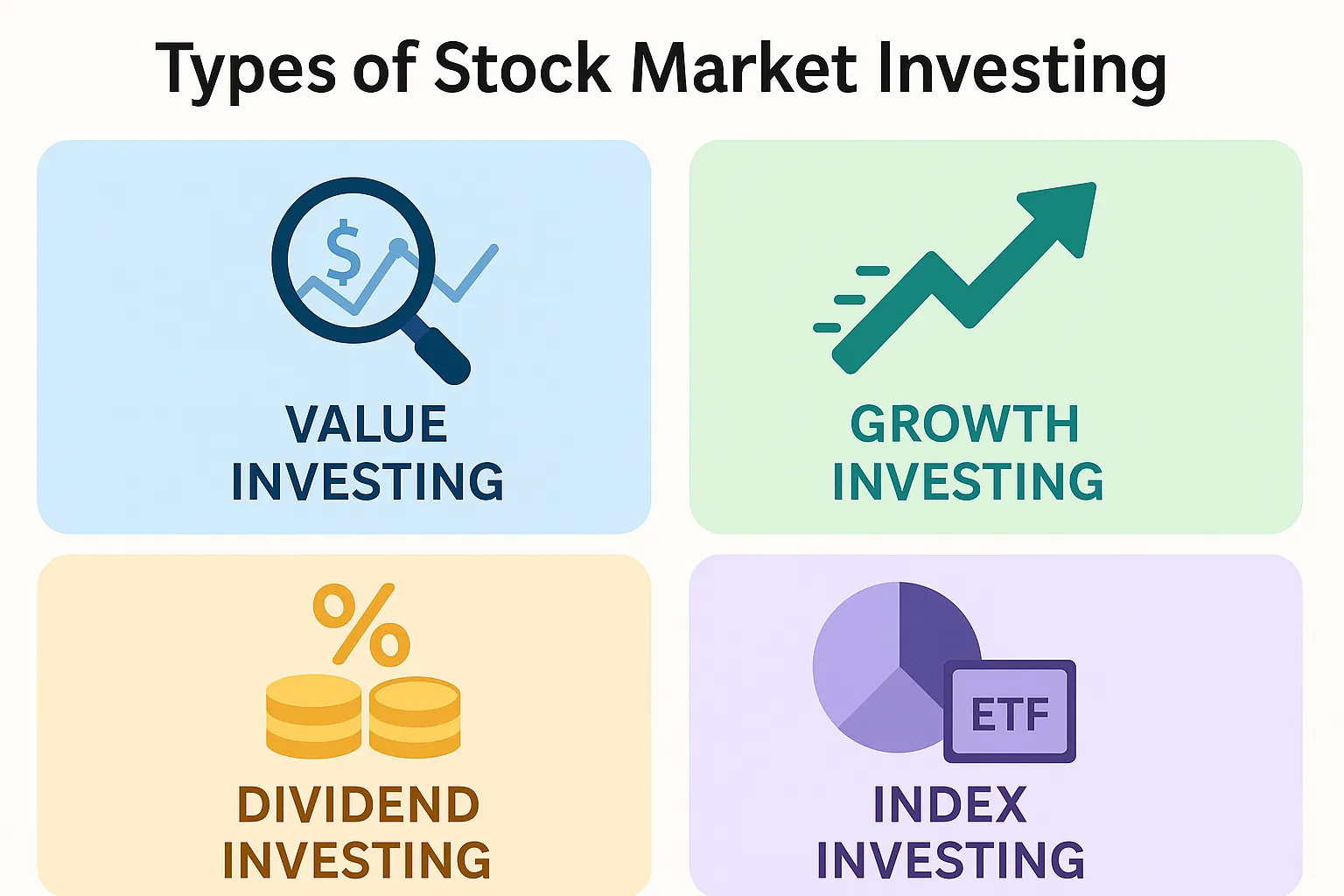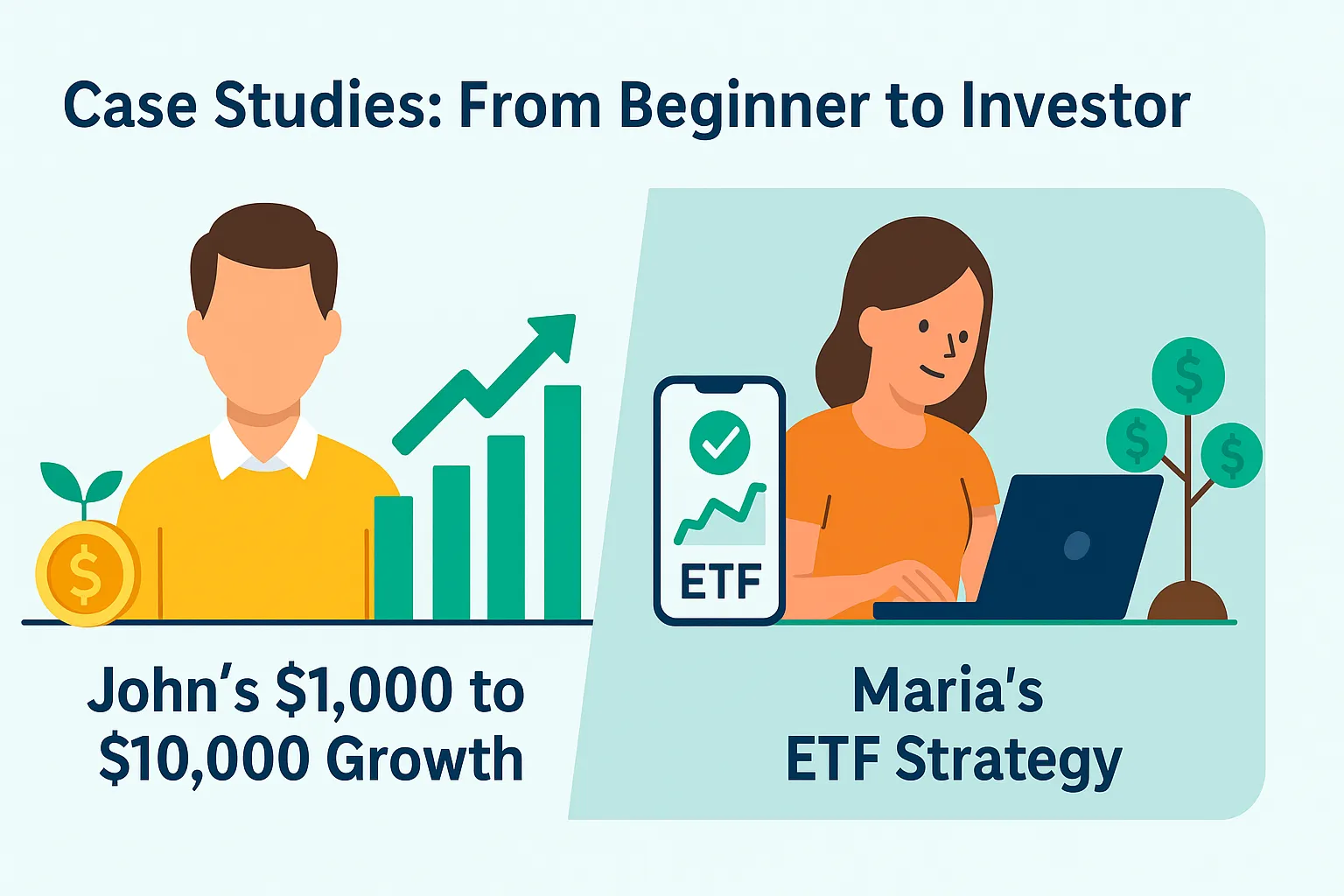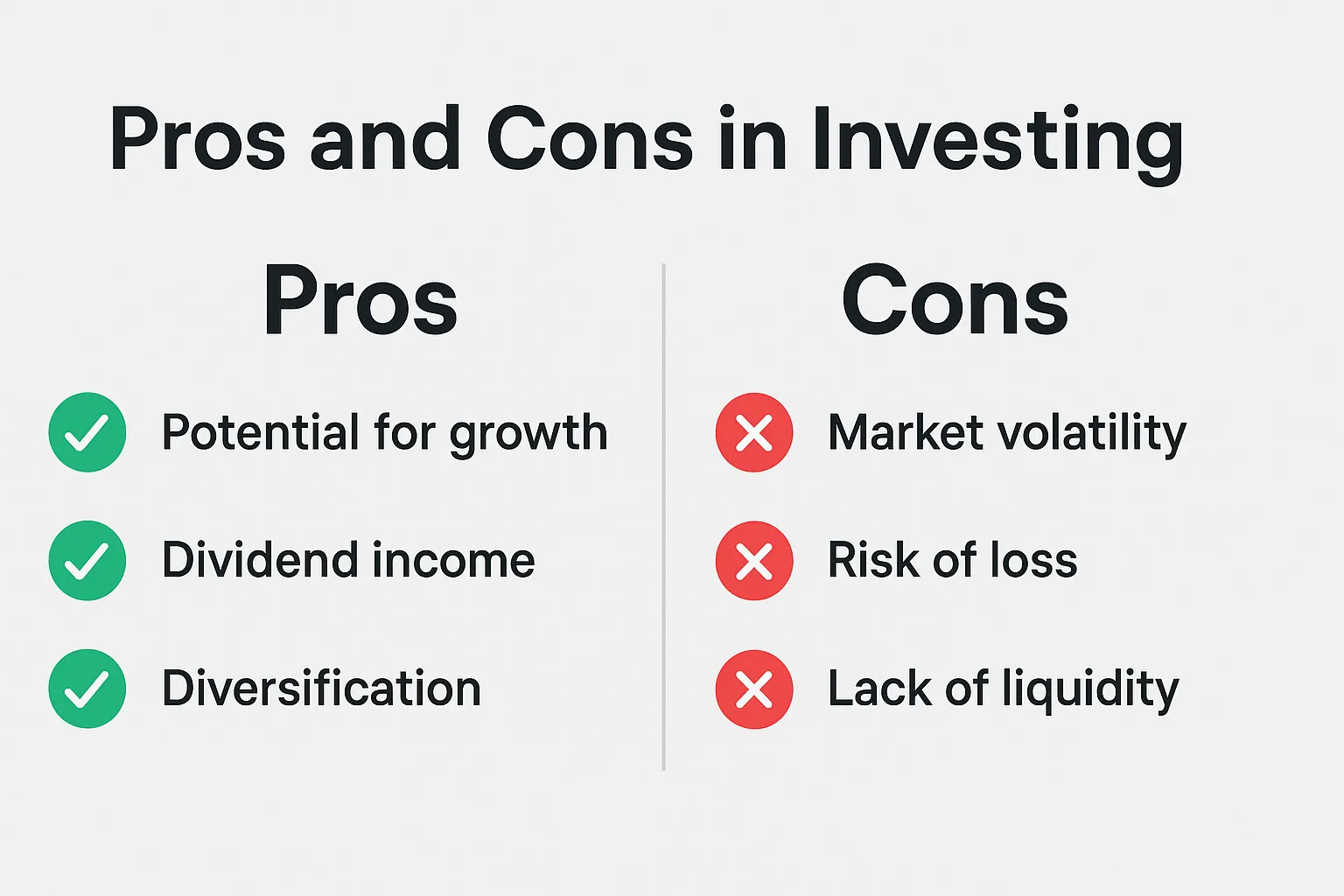
Fundamentals of Stock Market Investing
🔎 Summary of This Guide
Learn the core principles of stock market investing—from why stocks matter to how you can build wealth with sound strategy. Includes real-life case studies, expert insights, pros and cons, and high-authority resources to sharpen your skills.
📚 Table of Contents
- Why Invest in the Stock Market?
- Understanding What a Stock Represents
- Types of Stock Market Investing
- Case Studies: From Beginner to Investor
- Expert Opinions
- Pros and Cons
- Key Takeaways
- FAQ
- Further Reading
💡 Why Invest in the Stock Market?
Stock market investing is one of the most effective ways to build long-term wealth. Unlike savings accounts or short-term speculation, investing in equities allows your capital to grow through compound returns, dividends, and market appreciation.
According to Investopedia, investors who consistently contribute to the stock market over decades tend to outperform most other asset classes.
For example, the S&P 500 has historically returned an average of 8–10% annually, outperforming bonds, savings accounts, and even gold over long periods.
💬 “The stock market is a device for transferring money from the impatient to the patient.” — Warren Buffett
📎 Related: Owning Stocks Means Owning Businesses:contentReference[oaicite:0]{index=0}
📈 Understanding What a Stock Represents
When you purchase a stock, you’re not just buying a ticker symbol—you’re buying a piece of a real company.
This ownership comes with certain rights: voting on major decisions, receiving dividends (if applicable), and benefiting from the company’s success.
🔍 Many beginners confuse common stocks and preferred shares. If you’re unsure, read our breakdown of Forms of Stocks: Common vs Preferred:contentReference[oaicite:1]{index=1}
The key is understanding the business behind the stock. When you invest in Apple, you’re betting on innovation. When you buy into Costco, you’re backing bulk retail economics.
📘 Learn more: The Motley Fool: Stock Market Basics
🧠 Types of Stock Market Investing
There are several approaches to investing depending on your goals, risk tolerance, and timeline:
- Value Investing – Buying undervalued companies for long-term gain
- Growth Investing – Focusing on companies with high revenue and profit potential
- Dividend Investing – Earning regular income through payouts
- Index Investing – Passive investment in market-wide ETFs like SPY or VTI
📝 For those new to these terms, check out our post on How to Invest Your Money Smartly for Long-Term Growth:contentReference[oaicite:2]{index=2}
Or if you prefer a short intro, explore What Are Stocks?:contentReference[oaicite:3]{index=3}

📊 Case Studies: From Beginner to Investor
Let’s examine two real-world examples of individuals who started small and grew their stock investments with consistency and discipline.
Case Study 1: John’s $1,000 to $10,000 Growth
John, a 28-year-old school teacher, began investing in 2020 using fractional shares. He focused on blue-chip dividend stocks and reinvested every payout.
By following alerts from platforms like Lion Stock Alerts:contentReference[oaicite:0]{index=0} and keeping his portfolio diversified, he turned his initial $1,000 into over $10,000 in four years.
📌 Explore more success stories: How $100 Became $1,000:contentReference[oaicite:1]{index=1}
Case Study 2: Maria’s ETF Strategy
Maria, a single mom in her 30s, opted for index funds due to time constraints. She automated monthly contributions into S&P 500 ETFs through a brokerage account.
By keeping costs low and emotions out, she outperformed active traders while spending just 30 minutes a month monitoring her progress.
🧠 Expert Opinions
We reached out to financial analysts and investing educators for their take on the fundamentals of stock investing:
“Beginners should focus on understanding businesses rather than obsessing over stock prices. Read annual reports, follow earnings calls, and think long-term.”
— Sarah Liu, CFA and author of ‘Invest Smart, Not Fast’
“Start simple. Stick to ETFs or blue-chip stocks while you learn. Don’t jump into trading without understanding risk.”
— Mike Rawlins, Financial Coach & Host of The Weekly Portfolio Podcast
🎧 Looking for a mentor? Explore our guide to finding a day trading mentor:contentReference[oaicite:2]{index=2}.
✅ Pros and ❌ Cons of Stock Market Investing
| ✅ Pros | ❌ Cons |
|---|---|
| ✔ Compound growth over time | ✘ Market volatility and crashes |
| ✔ Dividend income potential | ✘ Requires emotional discipline |
| ✔ Access to a variety of sectors and global markets | ✘ Can be overwhelming for beginners |
| ✔ Liquidity – easy to buy/sell | ✘ Fees and taxes may reduce returns |
📌 Key Takeaways
- Stocks represent real ownership in companies, not just symbols on a screen.
- Consistency and patience matter more than market timing.
- Start small, but start now—compounding rewards the early.
- Index funds offer simplicity and diversification for beginners.
- Expert guidance, reliable alerts, and continuous learning are key to long-term success.

❓ Frequently Asked Questions (FAQ)
Q1: How much money do I need to start investing?
You can start with as little as $10 thanks to fractional shares offered by platforms like Robinhood, Fidelity, or Schwab. What matters more is consistency.
Q2: What’s the difference between trading and investing?
Trading involves short-term speculation, while investing is focused on long-term wealth creation. Beginners are generally advised to start as investors. Read our breakdown on Day Trading vs Swing Trading:contentReference[oaicite:0]{index=0}.
Q3: Are dividends important for beginners?
Yes. Reinvesting dividends can significantly boost your returns through compounding. It’s a passive way to earn more from companies that share profits with investors.
Q4: Should I invest in individual stocks or ETFs?
ETFs offer instant diversification and lower risk, making them ideal for new investors. As you learn, you can branch out into individual stocks with confidence.
Q5: How can I avoid common mistakes?
Stick to a plan, avoid panic-selling, and educate yourself constantly. Explore our guide on Mistakes New Traders Make:contentReference[oaicite:1]{index=1}.
📚 Further Reading & Related Content
- Fundamentals of Stock Market Investing:contentReference[oaicite:2]{index=2}
- How to Build a Diversified Portfolio with $1,000:contentReference[oaicite:3]{index=3}
- How a Stock’s Volume Can Affect Its Price:contentReference[oaicite:4]{index=4}
- SEC Guide to Savings and Investing (PDF)
- NASDAQ Investing Resources
🚀 Ready to Start Your Investing Journey?
Join thousands of smart traders and investors who use our alerts to stay ahead.
Visit our curated picks at Top Stock Alerts:contentReference[oaicite:5]{index=5} or get started with our Daily Stock Picks:contentReference[oaicite:6]{index=6}.

🌐 Recommended Resources for Smart Investors
Explore these trusted platforms to expand your financial literacy and stay informed about the stock market.
📘 Investopedia – Investing 101
A go-to hub for understanding stock terms, strategies, and portfolio-building tips.
Visit Investopedia📊 SEC – Beginner’s Guide to Investing
Learn how to protect your money and evaluate opportunities with guidance straight from the U.S. Securities and Exchange Commission.
View SEC Guide📰 CNBC – Market News
Get real-time stock updates, financial headlines, and market-moving trends.
Explore CNBC Markets📚 Morningstar – Investment Research
Deep-dive analysis on mutual funds, ETFs, and stocks to make informed decisions.
Visit Morningstar📈 Yahoo Finance – Stock Data
Research tickers, read stock news, and track portfolio performance.
Go to Yahoo Finance